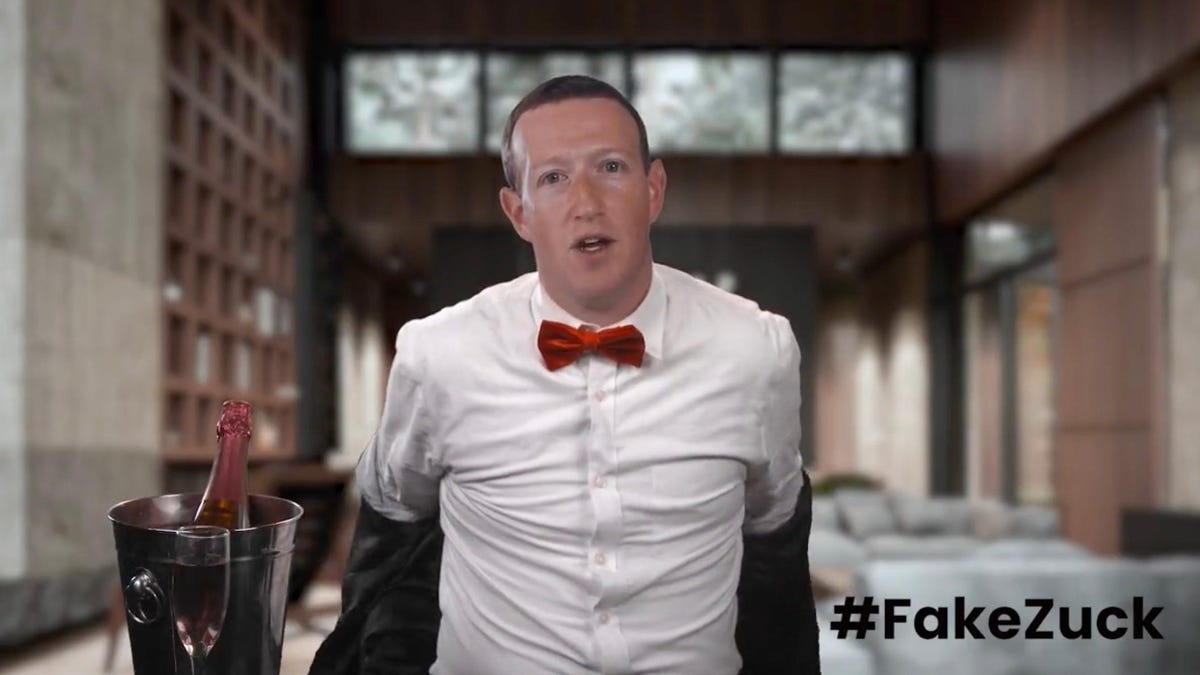
Demand Progress Action, the advocacy group behind the “fake zuck” deepfake originally uploaded the video, which digitally mimics both Zuckerberg’s appearance and voice, originally tried to upload the video to Instagram on November 29. The account was promptly suspended with no clear explanation. That same video appears pinned at the of the organization’s Twitter account.
Advertisement
Zuckerberg was directly asked about the account during the New York Times DealBook summit by commentator Andrew Ross Sorkin following reporting on the deep fake from Gizmodo and other outlets. During the exchange Zuckerberg appears to have said Meta kept the video before going on to argue in favor of similar videos like it.
“It was clear that it was a deepfake,” Zuckerberg said. “It was sort of like a parody. Allowing people to do humor and allowing people to show technology is important.” The CEO said Meta’s policies against manipulated media would kick in “if it was really trying to trick people.”
Despite those comments, Gizmodo spoke with the “fake zuck” account holder who said the account was suspended with no explanation or email other than an alert saying it or its content did not follow Meta’s community guidelines. The account creator says they recently tried to re-upload the video, this time under a new account called “deepfakezuck.” That account was also suspended around a day later, just like the original one. The account creator said they chose to re-upload the video on December 19 to direct attention toward Congress inability to pass antitrust reforms that, if successful, could have implicated Meta’s bottom line.
Advertisement
“At the same time their operatives in Congress killed strong antitrust reforms, Meta went back on its word that it wouldn’t remove what is clearly parody (and therefore within the bounds of its manipulated media policy) and—again—removed the #FakeZuck campaign from its Instagram platform,” Demand Progress Communications Director Maria Langholz told Gizmodo.
Meta’s policies for enforcing deep fakes say it will remove media if it has been synthesized, “in ways that aren’t apparent to an average person and would likely mislead someone into thinking that a subject of the video said words that they did not actually say.” The Zuckerberg video clearly does not meet those criteria, however, Meta does say it will also remove content if it is a product of AI that “merges, replaces or superimposes content onto a video, making it appear to be authentic.”
Advertisement
Meta did not respond to Gizmodo’s request for comment on why the accounts were removed.
Other platforms like Twitter and YouTube meanwhile continue to host the video, and the “fake zuck” accounts without issue. And while much of the attention over inconsistently applied content policies on the internet in recent weeks has, deservedly so, focused on the evolving hellscape that is Twitter, Langholz said the zuck deepfake confusion points to a wider, more personal problem.
Advertisement
“Maybe Elon Musk isn’t the only thin-skinned, capricious social media CEO,” Langholz said.
Fumali – Services Marketplace – Listings, Bookings & Reviews